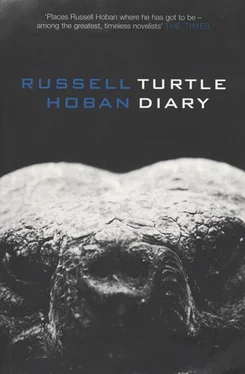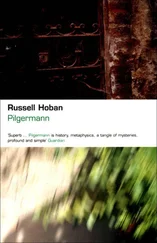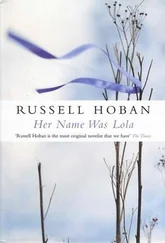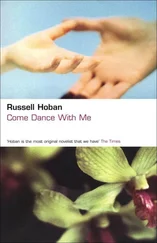Russell Hoban - Turtle Diary
Здесь есть возможность читать онлайн «Russell Hoban - Turtle Diary» весь текст электронной книги совершенно бесплатно (целиком полную версию без сокращений). В некоторых случаях можно слушать аудио, скачать через торрент в формате fb2 и присутствует краткое содержание. Год выпуска: 2000, Издательство: Bloomsbury Publishing PLC, Жанр: Современная проза, на английском языке. Описание произведения, (предисловие) а так же отзывы посетителей доступны на портале библиотеки ЛибКат.
- Название:Turtle Diary
- Автор:
- Издательство:Bloomsbury Publishing PLC
- Жанр:
- Год:2000
- ISBN:нет данных
- Рейтинг книги:3 / 5. Голосов: 1
-
Избранное:Добавить в избранное
- Отзывы:
-
Ваша оценка:
- 60
- 1
- 2
- 3
- 4
- 5
Turtle Diary: краткое содержание, описание и аннотация
Предлагаем к чтению аннотацию, описание, краткое содержание или предисловие (зависит от того, что написал сам автор книги «Turtle Diary»). Если вы не нашли необходимую информацию о книге — напишите в комментариях, мы постараемся отыскать её.
Turtle Diary — читать онлайн бесплатно полную книгу (весь текст) целиком
Ниже представлен текст книги, разбитый по страницам. Система сохранения места последней прочитанной страницы, позволяет с удобством читать онлайн бесплатно книгу «Turtle Diary», без необходимости каждый раз заново искать на чём Вы остановились. Поставьте закладку, и сможете в любой момент перейти на страницу, на которой закончили чтение.
Интервал:
Закладка:
There was a week of nature films on the South Bank and I went to see one about sharks. The film was made by a man of apparently unlimited wealth who fitted himself out with a large ship and any amount of special underwater gear for shark photography. He and his companions all agreed that diving among sharks was for them the ultimate challenge. They were particularly keen to encounter a great white shark, a rare species and the one most feared as a man-eater. They went from ocean to ocean looking for the great white shark and I couldn’t help wondering all the time how much it was costing. I think the money spent on even one of the special diving cages would keep me in high style for half a year at least.
For a large part of the time they followed whaling ships, photographing sharks feeding on whale carcasses. Sometimes they took their pictures from inside a cage but often they swam fearlessly among the sharks. They swam among blue sharks, dusky sharks, oceanic white-tipped sharks and several other kinds but they were continually frustrated by the absence of great white sharks.
Eventually they found a great white shark which they attracted with whale oil, blood and horsemeat. It was a truly terrifying creature and they very wisely stayed in their cage while the shark took the bars in his teeth and shook it about. The wealthy man said that it had been fantastic, incredible, beyond his expectations. His friends congratulated him on the success of the expedition and the film came to an end.
I found myself resenting that man, however unreasonable it might be of me. All the money in the world does not give him the right to muck about with a direful secret creature and shame the mystery of it with words like ‘fantastic’ and ‘incredible’. The divers were not the ultimate challenge for the shark, I’m certain of that. Socially they were out of their class, the shark would not have swum from ocean to ocean seeking them. It would have gone its mute and deadly way mindlessly being its awful self, innocent and murderous. It was the people who lusted for the fierce attention of the shark, like monkeys they had to make him notice them.
Money can do many things, even the great white shark can be played with by wealthy frotteurs in posh diving gear. But they have not really seen him or touched him because what he is to man is what is he to naked man alone-swimming. They have not found the great white shark, they have acted out some brothel fantasy with black rubber clothing and steel bars. Aluminium they were actually.
When I came out of the Queen Elizabeth Hall with the crowd there was a threadbare man playing a mouth organ. The lamps were lit along the promenade and on the bridges, trains rattled across the Hungerford Bridge, boats apparently powered by music went past with people dancing, lights glittered on the river and in the buildings across the river, there was a full moon, the night was balmy. The mouth organ buzzed its little music fiercely, the man’s eyes looked out fiercely over the mouth organ. I gave him 10p, he thanked me, sent his music after me like bees.
At a party I drank more than I should have done and found myself going on and on about Oedipus and Peter Rabbit, Thebes and Mr McGregor’s garden to Harry Rush of Pryntward Rush & Hope. Two days later there was a letter affirming his strong interest in my forthcoming From Oedipus to Peter Rabbit: The Tragic Heritage in Children’s Literature and offering me a £1,000 advance on signing.
On the morning when the letter came I was thinking that possibly the biggest tragedy in children’s literature is that people won’t stop writing it. It was one of those mornings when there suddenly seemed nothing whatever that could be taken for granted. I felt a stranger in my own head, as if the consciousness looking out through my eyes were some monstrous changeling. Here was the implacable morning light on all the books and litter that were always there but nothing was recognizable as having significance. What in the world was it all about, I found myself wondering.
People write books for children and other people write about the books written for children but I don’t think it’s for the children at all. I think that all the people who worry so much about the children are really worrying about themselves, about keeping their world together and getting the children to help them do it, getting the children to agree that it is indeed a world. Each new generation of children has to be told: ‘This is a world, this is what one does, one lives like this.’ Maybe our constant fear is that a generation of children will come along and say: ‘This is not a world, this is nothing, there’s no way to live at all.’
25 William G
Somebody’d told Harriet about a free demonstration of something called Original Therapy and she asked me if I’d like to go with her. Neither of us had any idea of what it might be and I couldn’t care less but I went. Anything to keep my mind off the turtles.
The place was in Maida Vale, the people had long hair and wore sandals which they mostly took off. There were a lot of good-looking feet in the crowd. The bearded men looked like Great Men of History from the neck up: Darwin, Pasteur, Mendeleyev, Faraday. From the neck down they looked like layabouts. The girls looked better to me but then girls usually do, there seems to me to be more human solidity in women than in men. Odd how one says girls and men. More than half the men were boys and more than half the girls were women who looked as if they’d seen a good deal of a certain kind of life and had cooked many hundredweights of brown rice. Oriental pillows on the floor, Buddhist and Zen books on the shelves, the I Ching, Laing, Castaneda, Hermann Hesse, The Whole Earth Catalog. Smell of old incense in the air.
The Original Therapy lady was a rampant-looking woman of about forty. Shiny red hair in the style of old musical films, tight white trousers, gold sandals, silver toenails, bursting purple silk blouse. Swarthy boyfriend with a St Christopher medal and a racing-driver watch strap.
Her name was Ruby and she sounded as if she lived in a caravan, her voice and her way of talking. She began to tell us about her therapy while some of the people in the room sat in the lotus position with very straight backs and others held their heads. One girl wailed a little now and then, another muttered the whole time.
She was American, this Ruby. Told us how she’d knocked about, been a rodeo rider, done roller derbies, wrestled, had three husbands and all kinds of troubles. Discovered her Original Therapy whilst wrestling one night. Another lady had a scissors grip on her and was squeezing very hard, got a bit over enthusiastic and wouldn’t let go. Under the pressure Ruby experienced a strange alteration of consciousness.
‘I was seeing all kinds of coloured lights and shooting sparks,’ she said, ‘and the sound of the crowd was beginning to come and go like the roar of surf far away. Something began to happen to me. I could feel myself going way way down and way way back, like thousands of years, millions of years, glaciers coming and going and the dinosaurs sinking into the swamps and the primitive trees being crushed into coal. Farther back than that even, crawling out of a warm ocean and gasping on the beach and beyond that back to the sea and smaller and smaller, all the way back to a single cell. And back beyond that to nothing, just the warm sea, what they call the primordial soup.’
Ruby went farther than the soup even, she got to a point where there was nothing, no time, no her, no anything. Then there came something like the idea of a question, a kind of original YES or NO? It put itself together as YES. There was a mystical green pattern with no sound, then a red explosion in Ruby’s mind and the people in the ringside seats were picking the other lady wrestler out of their laps. That was the turning point in Ruby’s life, going back to the origin of life and finding the big YES, and she was going to show us slides and then demonstrate her therapy.
Читать дальшеИнтервал:
Закладка:
Похожие книги на «Turtle Diary»
Представляем Вашему вниманию похожие книги на «Turtle Diary» списком для выбора. Мы отобрали схожую по названию и смыслу литературу в надежде предоставить читателям больше вариантов отыскать новые, интересные, ещё непрочитанные произведения.
Обсуждение, отзывы о книге «Turtle Diary» и просто собственные мнения читателей. Оставьте ваши комментарии, напишите, что Вы думаете о произведении, его смысле или главных героях. Укажите что конкретно понравилось, а что нет, и почему Вы так считаете.












